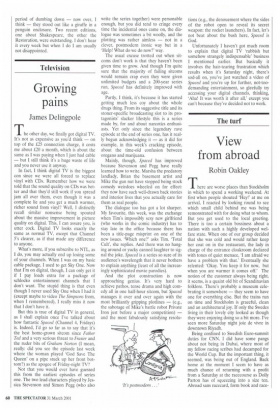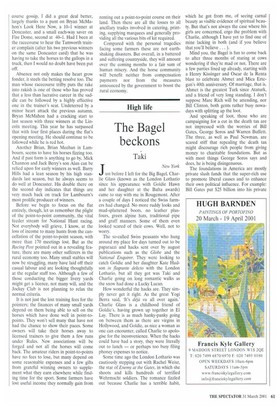View from abroad
Robin Oakley
There are worse places than Stockholm in which to spend a working weekend. At first when people shouted 'Hey!' at me on arrival, I reacted by looking round to see which small child behind me was being remonstrated with for doing what to whom. But you get used to the local greeting. There is too a certain bossiness about a nation with such a highly developed welfare state. When one of our group decided that she was cold and would rather keep her coat on in the restaurant, the lady in charge of the entrance cloakroom declared with tones of quiet menace, 'I am afraid we have a problem with that.' Eventually she relented: 'Okay. You keep it for now, but when you are warmer it comes off.' The notion of the customer always being right, it seems, is a quaint old bit of Scandinavian folklore. There's probably a museum celebrating it somewhere — they seem to have one for everything else. But the trains run on time and Stockholm is graceful, clean and an architectural joy. If only the Swedes living in their lovely city looked as though they were enjoying doing so a bit more. I've seen more Saturday night joie de vivre in downtown Riyadh.
Being confined to Swedish Euro-summit duties for CNN, I did have some pangs about not being in Dubai, where most of my fellow racing scribes had decamped for the World Cup. But the important thing, it seemed, was being out of England. Back home at the moment I seem to have as much chance of returning with a profit from a Saturday at the racecourse as Dolly Parton has of squeezing into a size ten. Abroad sans racecard, form book and race course gossip, I did a great deal better, largely thanks to a punt on Bryan McMahon's Look Here Now, a 10-1 winner at Doncaster, and a small each-way saver on Fire Dome, second at 40-1. Had I been at the racecourse to hear the Tamworth trainer complain (after his two previous winners on the same Doncaster card) that he was having to take the horses to the gallops in a truck, then I would no doubt have been put off.
Absence not only makes the heart grow fonder, it steels the betting resolve too. The man whose racecourse trilby puts the rake into rakish is one of those who has proved that a less than lucrative career in the saddle can be followed by a highly effective one in the trainer's seat. Undeterred by a minor heart attack the previous autumn. Bryan McMahon had a cracking start to last season with three winners at the Lincoln meeting. This year he has surpassed that with four first places during the fiat's opening meeting. He should continue to be followed while he is red hot.
Another Brian, Brian Meehan in Lambourn, seems to have his horses fizzing too. And if past form is anything to go by, Mick Channon and Jack Berry's son Alan can be relied upon for early winners as well. Barry Hills had a lean season by his high standards last season, but he always seems to do well at Doncaster. His double there on the second day indicates that things are very much back on track for Lambourn's most prolific producer of winners.
Before we begin to focus on the flat entirely, though, let us remember the plight of the point-to-point community, the vital feeder stream for National Hunt racing. Not everybody will grieve, I know, at the loss of income to many hunts from the cancellation of the point-to-point season, with more than 170 meetings lost. But as the Racing Post pointed out in a revealing feature, there are many other sufferers in the rural economy too. Many small stables will now be struggling, many have laid off their casual labour and are looking thoughtfully at the regular staff too. Although a few of those conducting the bigger livery yards might get a licence, not many will, and the Jockey Club is not planning to relax the normal criteria.
It is not just the lost training fees for the pointers: the finances of many small yards depend on them being able to sell on the horses which have done well in point-topoints. They won't sell many that have not had the chance to show their paces. Some owners will take their horses away to licensed trainers to give them a few runs under Rules. New associations will be forged and not all the horses will come back. The amateur riders in point-to-points have no fees to lose, but many depend on some reasonable expenses and a few gifts from grateful winning owners to supplement what they earn elsewhere while finding time for the sport. Some farmers have lost useful income they normally gain from
renting out a point-to-point course On their land. Then there are all the losses to all ancillary trades involved in catering, printing, supplying marquees and generally providing all the various bits of kit required.
Compared with the personal tragedies facing some farmers these are not earthshaking disasters. But overall, in a battered and suffering countryside, they will amount over the coming months to a fair sum of human misery. And the horse community will benefit neither from compensation payments nor from the measures announced by the government to boost the rural economy.



























































































 Previous page
Previous page